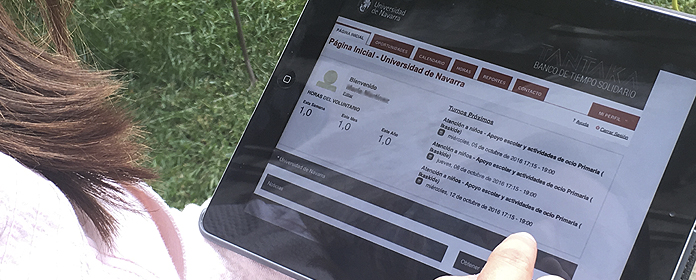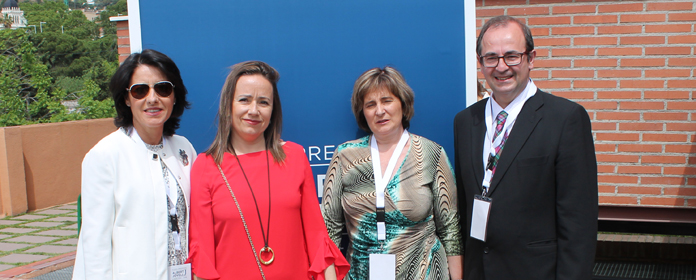project Peru: teaching to save lives
Eight medical students trained in first aid and health prevention travel to Peru to give workshops to various groups and provide health attendance in rural areas
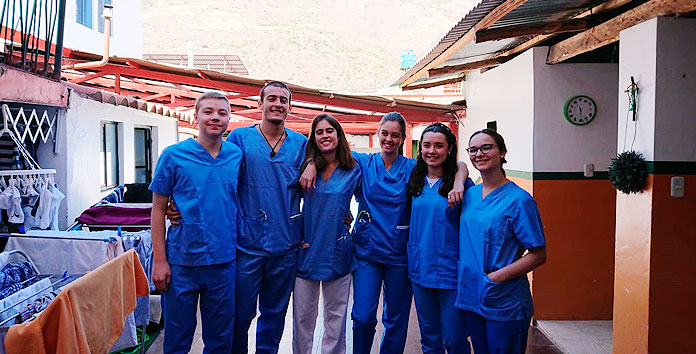
A different climate, food they are not used to, new schedules and the inconvenience of the change in altitude.. Eight students from School of Medicine at the University of Navarra traveled to Peru in July. Their goal: to give first aid and hygiene sessions in rural regions, where the presence of a doctor is a rare commodity but the educational work they do will be of enormous value to the population. For example, the volunteers will visit 20 schools during 37 days in the Latin American country and will provide health coverage in small towns such as Uripa, at an altitude of more than 3,000 meters. "Our main goal is to provide first aid knowledge to all those institutions that are interested. So far we have trained more than a thousand people in first aid and prevention in different health areas. We are also supporting local doctors and have provided health care in general medicine to more than 100 people in a rural setting in the province of Chincheros", explains Inés Zugasti, a 5th year medical student from Navarra.
This is the first international experience of association EqÜES, made up of more than 100 students from Schools of Medicine and Nursing at the University of Navarra, who aim to improve the lives of children and the elderly thanks to the theoretical and practical workshops they give free of charge. "The project that we are carrying out is new, since this is the first year that we are encouraged to develop an initiative of this size and outside Spain," says Raquel García, a 5th year student and founder of the association.
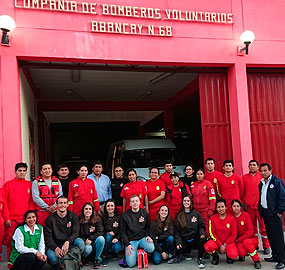 For the moment, in the days they have been in Peru, they have worked with the volunteer fire company 68 of Abancay conditioning their ambulance, giving training in first aid and accompanying them during their emergency exits as health support. All this is combined with first aid talks to different institutions proposed by the Clínica Santa Teresa and TantakaThe health campaign is being carried out in schools and institutes, staff specialized health care, police officers, prisoners... In addition, Uripa has just launched a health campaign with the support of the Dr. Meliza Polo Alvarez.
For the moment, in the days they have been in Peru, they have worked with the volunteer fire company 68 of Abancay conditioning their ambulance, giving training in first aid and accompanying them during their emergency exits as health support. All this is combined with first aid talks to different institutions proposed by the Clínica Santa Teresa and TantakaThe health campaign is being carried out in schools and institutes, staff specialized health care, police officers, prisoners... In addition, Uripa has just launched a health campaign with the support of the Dr. Meliza Polo Alvarez.
Precisely, thanks to it, they have also had a space in the regional radio stations to reach the most disadvantaged rural areas without medical support. Thanks to her, they have also had a space on the regional radio stations to reach the most disadvantaged rural areas without medical support. "It is clear that Peru is not only a warm country because of its climate: its people have opened their doors wide and have welcomed us with humility and much affection. We are learning a lot from this attitude of gratitude, predisposition and human values," confesses Teresa Espina, a second-year student.
Víctor López, from Pamplona, is in his sixth year and, about to finish his programs of study, assures that they do not waste every opportunity they are given, always according to their limitations and capabilities. "At the end of the day, we take away many stories, the trust of many people and the knowledge that listening to people is sometimes more important than the most specialized treatment we can provide them with."
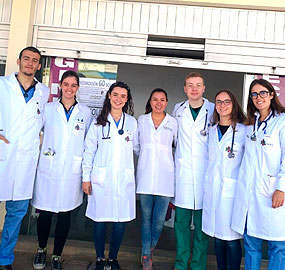 Nevertheless, the students agree that this project has been a challenge They have had to adapt to the climate, the food, with new schedules, to which the change in altitude is added. "In addition, we have been working 24/7 for any emergency that may arise, and today, in the clinic we have a schedule from 8 a.m. to 5 p.m. due to the great demand," he explains. Carlos Jaume. "This is, of course, psychologically demanding given the limited means at our disposal. However, so far, the experience has been very enriching. It is a luxury to be able to help people who need it at the same time that we put on internship what we have studied in different fields, all of them related to Medicine".
Nevertheless, the students agree that this project has been a challenge They have had to adapt to the climate, the food, with new schedules, to which the change in altitude is added. "In addition, we have been working 24/7 for any emergency that may arise, and today, in the clinic we have a schedule from 8 a.m. to 5 p.m. due to the great demand," he explains. Carlos Jaume. "This is, of course, psychologically demanding given the limited means at our disposal. However, so far, the experience has been very enriching. It is a luxury to be able to help people who need it at the same time that we put on internship what we have studied in different fields, all of them related to Medicine".


